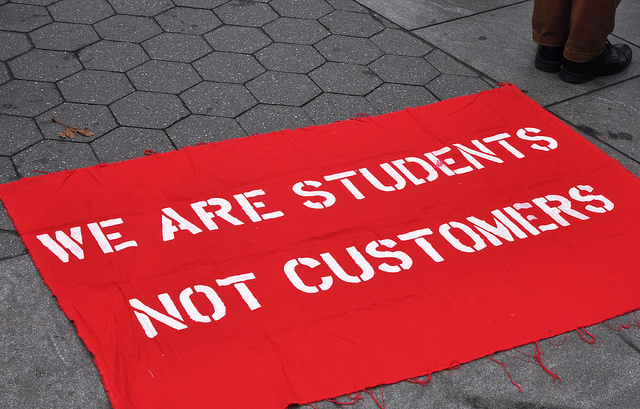
The government is proposing a change to the student loan conditions of everyone who entered higher education post-2012. This will make millions of graduates pay more money back, earlier than they expected.
What is the change, why is it happening and what is the alternative?
1. A very broken promise.
In 2010, the government claimed its new fees system would protect low earners. Graduates would only have to make repayments on income over £21k, and that threshold would increase to reflect inflation.
The only way it could justify giving students an average debt burden of £44k was to make the conditions generous enough that most students wouldn’t worry about taking on huge loans to get a degree.
But now the government is going back on these promises. Students who attended university on the understanding that they would only start to pay back when they were earning a near-average salary are about to get a nasty shock.
2. Loans can’t go on like this.
In the latest consultation, maintaining the system introduced just three years ago is barely considered an option – the government describes its own loans system as ‘unaffordable’.
The amount of money projected to be paid back under the current system is much lower than the government predicted, due to economic stagnation and the total failure to return to what was considered a normal economy prior to the 2008 crash. The percentage of each loan predicted to be written off is now at 45% – meaning the £9k fee system is actually on the verge of costing more than the £3k system it replaced.
We are now being asked to make up for the coalition’s mistakes – not only have we had to accept colossal debt, we’re now going to shoulder the responsibility of making up the gap in a system we opposed.
3. We will pay more even if we earn less.
The government is consulting on proposals to freeze the repayment threshold until at least 2021. As inflation and living costs rise, the threshold will fall in real terms. Repayments will be higher, and lower-waged graduates will start having to pay.
This is all possible because when we took out student loans the small print said that the repayment regulations could change. Student loans are some of the only loans where the lender can change the repayment conditions after they have been agreed. No one would accept a mortgage that the bank could alter at any time – but the government can change our student loans at will.
4. Low income is no excuse.
This change is obviously a pretty big deal. It consists of the government being able to raid money from a whole generation of students at will.
2m borrowers are predicted to be affected. The government thinks that graduates on starting salaries of £21k or £30k would repay an additional £6.1k each before their debt is written off after 30 years. By comparison, graduates starting at £40k, who would previously have expected to pay off virtually their entire debt, will repay just £300 more under the new system. Graduates earning £50k will actually pay back less.
The government expects to make £3.2bn in extra repayments from existing undergraduates, and more from future students, by raiding the pockets of low and medium income graduates.
Given that half of students now leave university and don’t get a graduate job, this is also going to hit hundreds of thousands of students who are not earning the ‘graduate wage’ they were promised. The sheer crapness of the job market and the economy will be made much worse for this generation of students by the Conservatives’ attempts to fund their idiotic £9k fee regime by making us pay.
5. Looming privatisation.
The coalition shelved plans to privatise student debt in 2014 after the Lib Dems backed down following student pressure. But the Tories have always held the aspiration of selling off student debt (probably for much less than it’s worth, if RBS and the Royal Mail are anything to go by).
Rothschild, when it examined the possibility of selling debt in the ‘Project Hero’ report, said that before the debt could be sold off it would have to be made more attractive to buyers. The company suggested the best way of doing this was to make the repayment conditions harsher, meaning the private owners of our debt would make more profit. At the time this seemed like political suicide – but now, with the government setting a precedent, any future privatisation could involve a repayment change with a lot less fuss. This repayment change could be the first step towards millions of students having their loans sold off.
What is the alternative?
The solution is obvious: writing off student debt, and introducing a free education system that treats education as a public good and funds it by taxing concentrations of wealth.
Just a 2% rise in corporation tax could cover the cost of abolishing tuition fees. Given the UK currently has a corporation tax level so low that Japan classifies it as a tax haven, it doesn’t seem an outrageous demand. Writing off debt could be financed in a number of ways – from further corporation tax rises to tightening up on tax evasion, raising national insurance or slowing down austerity.
These would all be sound economic decisions, because they prevent the losses building up in the future by paying for education now. Former business secretary Vince Cable may have been able to laugh that “these losses crystallise in 30 to 40 years’ time – when I’m well over 100” – but the rest of us can’t.
Only a total shift in the way we fund higher education can solve the graduate debt crisis.
Sections of this article are taken from the forthcoming National Campaign Against Fees and Cuts pamphlet, ‘Their Education and Ours’.
–
Novara Media will soon be trying to raise £10k in just 30 days. To keep in the loop, go to support.novaramedia.com.